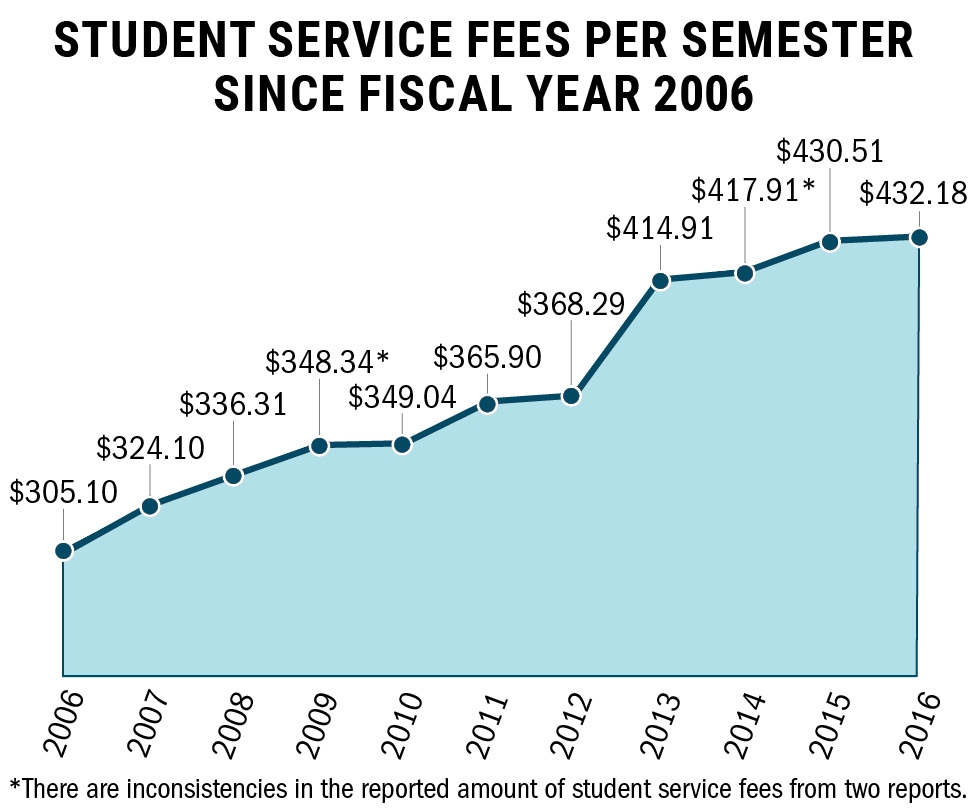Do mandatory fees trap students into supporting groups they don’t agree with?
Mandatory student fees to support campus groups are a common practice at many colleges and universities. But lawmakers in Wisconsin and Minnesota want to give students the right to “opt out of required fees that go to clubs and causes with which they disagree,” as reported by the Washington Post.
They [lawmakers] say their proposals would give students the right to vote their consciences when choosing how their money is divided up—and would slow the growth of student fees.

University of Minnesota Twin Cities students pay $436.60 in Student Service Fees per semester if they are registered in six or more courses. These fees “provide funding for student programs, activities, and services on each campus” and consistently increase each year as the graph above shows.
Included in the Student Service Fees are Student Activity Fees, which gave the U of MN Twin Cities $1.4 million in revenue for fiscal year 2018 to disperse to student groups for operation and programming costs. Over 100 student organizations requested funding for fall 2017—but not all organizations that asked, received. It is up to the Student Service Fees Committee to determine which groups are funded per semester and by how much.
For example, the Coptic Orthodox Christian Association requested $2,450 and received $200 while the Queer Student Cultural Center’s total allocation was $22,759.06 out of the requested $27,726.53. Campus Atheists, Skeptics and Humanists asked for $4,033.83 and received $3,532.55.
Is it a violation of students’ First Amendment rights when they are forced to subsidize the speech of groups they don’t support? The Washington Post continues:
Proposals such as these raise the question of whether freedom of speech includes the right of students to prevent their money from going to certain groups, from the University of Wisconsin’s Sex Out Loud sexual-health organization to the University of Minnesota’s Campus Atheists, Skeptics and Humanists.
Courts have ruled that universities and colleges can require their students to pay for clubs such as these, as long as anyone can join them or attend their functions.
But just because mandatory student fees aren’t constitutionally prohibited does not mean universities must practice compulsory funding. It’s inconsistent with individual choice and giving students the freedom to speak for themselves.
In union settings, there is a similar debate going on over public employees being forced to pay dues to advance a union’s political agenda its members may not support.
The Supreme Court has ruled that dissenters from a union’s political stances cannot be compelled to support political spending through mandatory dues and fees but must then pay “fair share fees” (85 percent of full union dues in Minnesota) to cover the cost of union representation and collective bargaining.
These fair share fees still end up financing political activities because—as my colleague Kim Crockett wrote about here—all collective bargaining is political.
Which brings us to the all-important Janus v. AFSCME case. Mark Janus, the plaintiff, is asking the Supreme Court to reconsider whether public employees should be forced to pay union dues—even the fair share portion—under the premise that the issues public employee unions negotiate are inherently political.
The Janus case will be argued before the Supreme Court in January or February, and while the Student Activity Fee opt-out measure didn’t pass this year in the Minnesota Legislature, it is expected the same proposal will be reintroduced next year.